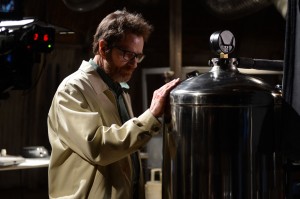
Courtesy of AMC
It’s done. After a five-season run, AMC’s “Breaking Bad” is over. Sunday night’s airing of “Felina” earned 10.3 million viewers, beating last week’s “Granite State” and making it the most watched episode in the series. Numbers aside, “Felina” lived up to the hype, delivering a fittingly bittersweet ending to one of the best TV dramas ever. Obviously, the following review contains major spoilers.
Of course, all the loose ends were tied up. Walt devised a way to launder his remaining $9 million thanks to the “charity” of Gretchen and Elliott. Lydia and the skinheads went to Belize courtesy of the ricin and M60. Walt saw his family one last time. Jesse made it out alive. And — after finally securing the physical and financial safety of his family, the ostensible impetus for his entering the meth business — Walt died.
Yet it’s not the resolution alone that makes “Felina” a satisfying end to the series, it’s how tidy everything was. Season-long arcs concluded one at a time, gliding from one scene to the next, each resounding longer than the last. This linearity in narrative isn’t typical of “Bad,” but it worked here, giving viewers space to breathe and the characters individual screen time to sign off.
Sure, “Felina” eschewed the series’ characteristic plot twists. But that’s to be expected of a series finale, especially for a show like “Bad” where closure is so rarely given. If episode 5×14 “Ozymandias” was the climactic crash and burn of Heisenberg’s empire, these last two episodes are the aftermath, marking the weary return of a feeble Walter White and his last attempt to put things right. Developments like the Walt vs. Jack and Jesse vs. Todd showdowns seemed predictable but ultimately felt necessary on an emotional level.
Still, I couldn’t help but feel “Ozymandias” already stole the show — and rightfully so. Even writer and director Vince Gilligan admitted that “Ozymandias” was “the best episode we ever had or ever will have.” This isn’t to say “Felina” disappointed. I just don’t think it’ll go down as one of the more classic “Bad” episodes (see “Pilot,” “Full Measure,” “Cornered,” “Confessions”).
Maybe my biggest problem with “Felina” was Jesse’s absence from the episode. Christ, the kid said three lines before driving off into the night. Don’t get me wrong, Aaron Paul killed it as usual. His ability to convey the perfect blend of rage, despair, and gratitude without speaking a word is incredible. That said, the final goodbye between Walt and Jesse felt a little phlegmatic given their history. I would have preferred something more affectionate between the one-time partners and, dare I say, friends. Then again, maybe that’s what they deserved.
After all, “Bad” is, at its most elementary, a morality tale. The entire series interrogates the notion of causation, blurring our sense of morality then demanding we take a stance. Gilligan said that the ambiguity of “The Sopranos” or the bleakness of “The Wire” finales wouldn’t work with a show like “Bad.” Instead, what’s left is a surprisingly happy ending tempered with uncertainty. The episode’s final moments are accompanied by Badfinger’s “Baby Blue,” a seemingly tailor-made song about a man who “guess he got what he deserves.” Likewise, we are faced with the question: Did Walt redeem himself?
Simply put, no. In the end, Walt dies mostly on his own terms — by his own bullet, no less. There is no absolution, the transformation from Mr. Chips to Scarface complete. But to say there is no epiphany, no change in heart would be too simplistic. There is indeed a perverse sense of victory for Walt, who finally comes to terms with the things he’s done. This shift is brilliantly highlighted when Walt admits to Skyler, “I did it for me. I liked it. I was good at it. And I was really… I felt alive.”
In this way, “Felina” brings the series full circle. While it doesn’t shoehorn a last-minute reversion to Walter White, chemistry teacher, it does offer an unapologetic glimpse of Walter White, chemistry teacher-turned meth kingpin-turned broken man. Leading man Bryan Cranston once again dons the iconic green oxford, khakis, and a pair of Wallabees, paying subtle homage to the pilot episode. But this time, the clothes are intentionally oversized and baggy, presenting Walt as a sunken hull of his former self ready to make his peace.
So while “Felina” doesn’t necessarily feature the most sophisticated narrative, nor does it resort to an overtly sentimental montage of better days gone by, it does offer a sense of finality to one of the greatest stories ever told, television or otherwise.
Like Walt said himself, “It should make for one hell of a story.”
Gould is a member of the class of 2014.



